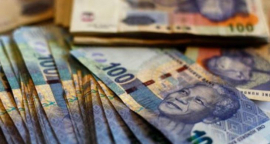South Africa, France and Germany have signed loan agreements for the two European nations to each extend €300 million in concessional financing to South Africa to support the country’s efforts to reduce its reliance on coal through a just transition to cleaner energy sources.
This was on Wednesday confirmed by National Treasury.
In a statement, Treasury said the French and German public development banks, AFD and KfW, have provided the loans directly to the South African government via National Treasury.
The financing agreements were acknowledged and welcomed by President Cyril Ramaphosa, French President Emmanuel Macron, and Olaf Scholz, the Federal Chancellor of the Federal Republic of Germany, at a ceremony held during the 27th United Nations Climate Change Conference (COP27), currently taking place in Sharm El Sheikh, Egypt.
Treasury said the signing represents a significant milestone in the implementation of the Just Energy Transition Partnership (JETP) announced at COP26 in November last year.
“The JETP is a long-term partnership between South Africa, France, Germany, the United Kingdom, United States, and the European Union. The first initiative of its kind, the JETP aspires to support South Africa in accelerating its journey to a low-carbon economy and climate-resilient society,” said Treasury.
Last year, the founding partners of the JETP, known as the International Partners Group (IPG), pledged to mobilise an initial amount of $8.5 billion over the next three to five years to advance the partnership.
Andreas Peschke, the German Ambassador to South Africa, said: “We are very happy about these agreements, as they represent a very concrete implementation of our partnership.”
South Africa continues to be dependent on coal to produce most of its electricity and the coal sector remains significant to the country’s national economy and the livelihood of several communities.
“One year ago, French President Emmanuel Macron pledged that France was ready to commit significant support for South Africa’s ambitious decarbonisation project for a just energy transition. We are now putting those words into action with this important loan,” said Arnaud Roux, Chargé d’affaires of the French Embassy.
Audrey Rojkoff, AFD Regional Director for Southern Africa and Country Director for South Africa, said most countries around the world are trying to find a balance between the inevitable short-term trade-offs and the long-term perspective of a future, where nature and people prosper.
“All partners can make better progress by sharing their experiences and international institutions have an important role to play by encouraging dialogue. This first public policy loan to South Africa aims precisely at promoting policy dialogue between our countries.”
She indicated that along with dialogue and knowledge-sharing with other countries, continued research will also be essential to fully understand potential climate risks and their impact on South Africa’s financial system. As such, the AFD loan will be accompanied by grant financings from France to support several key South African actors involved in the production of knowledge and further policy development related to the JET.
“We expressly welcome South Africa’s commitment to reducing electricity generation from environmentally harmful coal,” said Silke Stadtmann, KfW Development Bank’s Country Director for South Africa.
She said the development was an important step in achieving the country’s climate goals.
“As a long-term partner of South Africa, we support these efforts not only with concessional loans for necessary investments and grants for a Just Energy Transition, but also with comprehensive studies on energy sector reform.”
Ismail Momoniat, acting National Treasury Director-General, said the South African government welcomes concessional funding.
“While South Africa still requires more support for its Just Transition path, considering the scale of the required transition in the context of the current socio-economic challenges of high unemployment, high level of poverty and inequality, this funding will assist in addressing the challenge of financing the critical adaptation and mitigation programmes and supporting a resilient, sustainable, and inclusive growth,” Momoniat said.
The funding will also provide the much-needed catalytic funding for the implementation of the Just Energy Transition investments plan in mapping out a just transition to a low-carbon, climate resilient economy and society.
These loans are concessional and contribute to government’s efforts to mitigate rising government debt costs.












